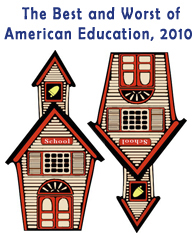Best and Worst in American Education, 2010
BEST Education Events of 2010
1. Release of high-profile movies that illuminate America’s education crisis and failure, especially Waiting for Superman, as well as The Lottery and The Cartel.

Though not perfect, Waiting for Superman is a vivid and sympathetic evocation of the educational plight of inner-city kids and how much they and their parents yearn for something better. It shows the inadequate supply of that something better: mainly high-performing charter schools. That it was made by Davis Guggenheim and distributed by Paramount indicates the widening of the education reform movement and of support for school choice. Such a film could not have been made—or commanded an audience—a decade ago.
2. Los Angeles Times publishes teacher evaluations based on test scores.
![]()
California’s premier newspaper made a serious study of the contributions of some 6,000 Los Angeles elementary teachers to student learning and reported how each was doing—including a list of the 100 most effective instructors in grades 3 through 5. This carries some hazards, for test score changes may be misinterpreted, yet it injected value-added measures of teacher effectiveness into public awareness in a vivid way and made clear the sea change in how the United States views teaching. We now understand that effective teachers are those who boost student learning, that teacher effectiveness can be measured, albeit imperfectly, and that too many conventional teacher evaluation systems conceal low performance and fail to recognize excellence.
3. Ratification of the Washington, DC, teachers' union contract.

Image credit:
FEMA / Greg Henshall
The new contract provides for a true differentiation of teachers on the basis of their performance and gives management greater leverage in determining which instructors to retain. Underlying it is an ambitious evaluation system that incorporates value-added measures of pupil achievement.
4. The Institute of Education Sciences (IES) published “Achievement Effects of Four Early Elementary School Math Curricula: Findings for First and Second Graders,” as well as first-year findings of an ongoing study of professional development for middle-school math teachers.

Education reform discussions often neglect curriculum. The first of these path-breaking and methodologically sophisticated IES studies shows that curriculum matters at least as much as higher-profile reforms. Sadly, the second study shows that it is extremely difficult to improve teacher performance via professional development and raises the possibility that most current efforts of that sort are a waste of time and money. There was a renaissance of rigorous, federally sponsored education research during the George W. Bush administration; these laudable studies were launched during that renaissance.
5. “Race to the Top” (see below).
WORST Education Events of 2010
1. Stimulus dollars for education were mainly spent on avoiding layoffs.
![]()
About 80 percent of the administration’s $100 billion education stimulus money went to avert teacher layoffs and continue existing programs without regard to their effectiveness and with no hint of school improvement. The $10 billion EduJobs bill did more of the same. Such spending rewarded schools for inefficiency at an enormous cost in dollars and missed opportunities.
2. Adrian Fenty lost the DC mayoral primary, followed by the departure of schools chancellor Michelle Rhee
 Rhee had been one of the best superintendents in America, doing much to advance a bold reform agenda and producing solid evidence that such changes can work. The mayor’s loss and her exit are bad for DC and its children; they may also show that the radical changes needed to boost student achievement are politically vulnerable.
Rhee had been one of the best superintendents in America, doing much to advance a bold reform agenda and producing solid evidence that such changes can work. The mayor’s loss and her exit are bad for DC and its children; they may also show that the radical changes needed to boost student achievement are politically vulnerable.
3. Governor Charlie Crist’s veto of the Florida tenure reform bill.

Image credit:
State of Florida
Florida Governor Charlie Crist
This was a big setback for those keen to solve the most irksome education problem of all; that is, the right of ineffectual teachers to cling to their jobs. His veto contributed decisively to the Florida GOP’s rejection of Governor Crist and his eventual loss in the U.S. Senate race.
4. The demise of the District of Columbia opportunity scholarship program.

Image credit:
White House photo by Joyce N. Boghosian
Obamas at DC charter school
Washington, DC, has been one of the few places with a viable voucher option for low-income children trapped in low-performing schools—and that program has shown promising results. Yet it is coming to an end at the hands of congressional Democrats, unopposed by the Obama administration (which has supported increased choice through charter schools). A program that has been helping low-income African American students complete school is now headed to its grave with the assent of our first African American president (whose own children attend an elite private school).
5. “Race to the Top” (see below).
BEST and WORST Education Events of 2010
“Race to the Top”

Image credit:
U.S. Department of Education
Best: The competition for these federal dollars triggered good policy changes in a number of states, including the capacity to link student achievement to teacher performance reviews and the loosening of caps on the number of charter schools in a state.
Worst: From the selection of Delaware and Tennessee in round one to the inclusion of undeserving states in round two, as well as rejection of two outstanding applicants (Louisiana and Colorado), the Obama administration disappointed those who believed that the president truly places children ahead of unions and politics. At least three winners were absurd choices (Hawaii, Maryland, Ohio). The selection process rewarded a teachers’ union “buy in,” a recipe for maintaining the status quo. By tying worthy reforms to the lure of federal money, “Race to the Top” may lead to setbacks in states that agreed to make the changes but didn’t get the money.
America’s troubled schools attracted unusual attention during 2010, for both good and ill. How can we sort out the year’s many education developments to determine what truly mattered?
Hoover’s Koret Task Force on K-12 Education pored over the year’s key events, deliberating, arguing, voting, and finally rendering a verdict. The eleven education experts in the task force selected nine notable events; four exclusively in the best-of-year category, four in the worst category, and one—U.S. education secretary Arne Duncan’s high-profile “Race to the Top” competition—clearly in both.
“We considered dozens of people, laws, programs, events, and studies,” explained Hoover Institution research fellow and project director Williamson M. Evers, “and we weren’t always unanimous. But the short lists that emerged illustrate the hits and misses, the glory and the folly of contemporary American school reform.”
Topping the bests are the emotional roller-coaster documentary Waiting for Superman and the Los Angeles Times’s brave and controversial publishing of data on teacher performance.
Leading the worsts are the wasted opportunity for reform in the billions of education dollars lavished on the status quo by President Obama’s stimulus package and the postelection exit of reformer Michelle Rhee from the Washington, DC, public schools.
Runners-up for best are ratification of a performance-linked teachers’ contract in DC (one of Rhee’s signal accomplishments) and a federal study showing that the choice of math curriculum makes as much difference in student achievement as do sexier policy decisions.
Runners-up for worst are outgoing Florida governor Charlie Crist’s veto of a bold teacher-tenure reform measure in the Sunshine State and Congress’s decision (endorsed by the White House) to end the successful DC “opportunity scholarship” program.
“Race to the Top” made it onto both lists. Its tightly focused, competitive nature prompted worthy reforms in a number of states. But it also yielded large grants for several undeserving states and denied grants to at least two states that were worthy applicants.
“This was an amazing year for education,” commented task force chairman Chester E. Finn Jr., “full of thrills and spills, solid achievements and big blunders. We hope that 2011 brings many more of the former and far fewer of the latter.”
CONTACT INFORMATION
Williamson M. Evers
Mobile: (650) 380-1546
evers@stanford.edu
Chester E. Finn Jr.
Office: (202) 223-5450
Mobile: (202) 285-6600
cefinnjr@aol.com
Office of Public Affairs
Hoover Institution
Stanford University
(650) 723-0603








